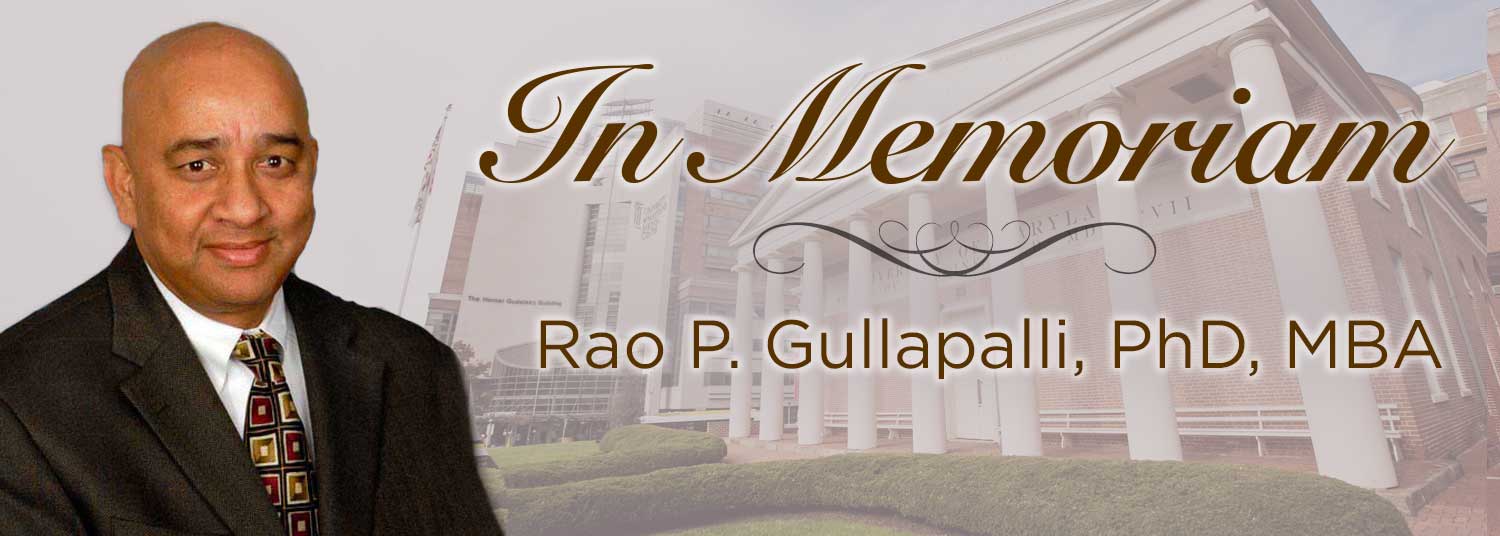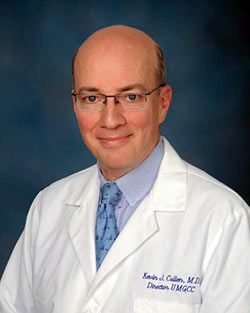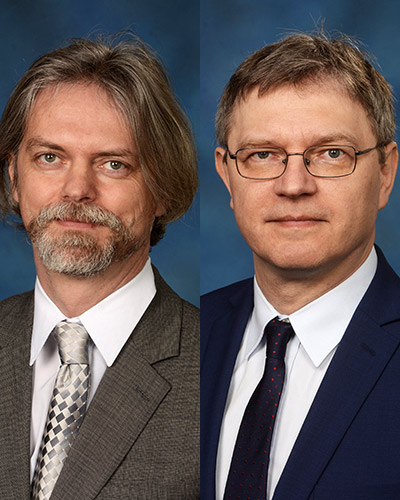April 21, 2023

The University of Maryland School of Medicine community is mourning the loss of one of its longtime senior faculty members, Dr. Rao Gullapalli, who was Professor of Diagnostic Radiology and Nuclear Medicine, Associate Vice Chair for Research in the Department and Director of the Core for Translational Research in Imaging (C-TRIM) and Director of the Center for Metabolic Imaging and Therapeutics (CMIT). He also held several leadership roles in cancer imaging at the UM Marlene and Stewart Greenebaum Comprehensive Cancer Center.
Dr. Gullapalli, a nationally recognized expert and scientist in medical imaging with specific training and expertise in developing novel magnetic resonance (MR) imaging techniques for clinical research, passed away on April 18 from complications of cancer. He is survived by his wife, Asha Gullapalli; daughters, Meera (Auburn University College of Veterinary Medicine) and Lekha (student at University of Massachussets Amherst); Mother Rukma Bai Gullapalli, sisters Bala Yalamanchi and Renu Korlipara and uncles, aunts, cousins, nieces and nephews.
 He was remembered by his colleagues for his warm and thoughtful demeanor and for his positive approach to his work.
He was remembered by his colleagues for his warm and thoughtful demeanor and for his positive approach to his work.
“In his relatively brief battle with cancer, Rao showed tremendous optimism, grace and courage,” said Kevin J. Cullen, MD, Professor of Medicine and Director, Marlene and Stewart Greenebaum Comprehensive Cancer Center (UMGCCC), who worked closely with Dr. Gullapalli. “Literally a few moments before he passed away, he wrote a note which said: ‘Take Care – This is a great, great, great community! Signed, Rao.’”
Dr. Gullapalli joined the UMSOM faculty 1996. His highly successful academic career led to significant scientific advances in studying longitudinal changes in structure and function following brain injury and developing image-guided interventional techniques.
His laboratory had been focused on developing new imaging biomarkers associated with traumatic brain injury and utilizing multi-parametric imaging for improving the sensitivity and specificity of injury detection. He recently led the discovery of diffusion kurtosis imaging for the detection of microstructural changes and neuro-inflammation.
Dr. Gullapalli was a widely recognized academic leader, researcher, and inventor, receiving multiple awards during his career, including “Outstanding Invention of the Year by the University of Maryland for his Minimally Invasive Neurosurgical Intracranial Robot.
Dr. Gullapalli authored over 150 peer-reviewed journal articles, spoke nationally and internationally as an authority of magnetic resonance imaging, served as the senior editor of Journal of Medical Robotics Research, and held twelve patents. Not only was he continually funded with federal and foundation awards for more than twenty-five years, but he was also instrumental in assisting junior faculty in securing funding. He served on multiple NIH Review panels including the Academic Industrial Partnership. It is not an exaggeration to say that Dr. Gullapalli transformed medical imaging research in both the department and the School of Medicine.
 While his academic achievement is significant, it is Dr. Gullapalli’s steadfast kindness, unwavering generosity of his time and talents with others, and seemingly inherent unwillingness to complain that stands out and will be so missed by the faculty and staff in the School of Medicine and especially in the Department of Radiology. As one of his closest friends and colleagues said, “Rao lived for everybody else. It was never about him. That was true in research and in his personal life. His kindness and generosity shone through till the very end.”
While his academic achievement is significant, it is Dr. Gullapalli’s steadfast kindness, unwavering generosity of his time and talents with others, and seemingly inherent unwillingness to complain that stands out and will be so missed by the faculty and staff in the School of Medicine and especially in the Department of Radiology. As one of his closest friends and colleagues said, “Rao lived for everybody else. It was never about him. That was true in research and in his personal life. His kindness and generosity shone through till the very end.”
Dr. Gullapalli graduated with his B. Tech Degree in Chemical Engineering from Osmania University, and graduated at the top of his post-graduate class in Minerals Engineering from the Indian Institute of Technology in Kharagpur, India. He then received both his MS Degree in Chemical Engineering, and his PhD in Instrumental Sciences from the University of Arkansas. Later, he earned an MBA Degree from Case Western Reserve University.
Contact
Office of Public Affairs
655 West Baltimore Street
Bressler Research Building 14-002
Baltimore, Maryland 21201-1559
Contact Media Relations
(410) 706-5260
Related stories

Tuesday, May 02, 2023
AI in Medical Imaging Could Magnify Health Inequities, Study Finds
Artificial intelligence (AI) technology in the medical field has the possibility to automate diagnoses, decrease physician workload, and even to bring specialized healthcare to people in rural areas or developing countries. However, with possibility comes potential pitfalls.

Wednesday, April 26, 2023
Long COVID Sufferers with Cognitive Complaints and Mental Health Issues Have Changes in Brain Function, New Study Suggests
Those who experience brain fog, memory issues or other neuropsychiatric symptoms for months after a COVID-19 diagnosis were found to have abnormal brain activity during memory tests on functional magnetic resonance imaging (MRI), according to a new study led by University of Maryland School of Medicine (UMSOM) researchers.

Friday, July 29, 2022
Children Who Lack Sleep May Experience Detrimental Impact on Brain and Cognitive Development That Persists Over Time, UM School of Medicine Study Finds
Elementary school-age children who get less than nine hours of sleep per night have significant differences in certain brain regions responsible for memory, intelligence, and well-being compared to those who get the recommended 9-12 hours of sleep per night, according to a new study led by University of Maryland School of Medicine (UMSOM) researchers. Such differences correlated with greater mental health problems like depression, anxiety, and impulsive behaviors in those who lacked sleep. Inadequate sleep was also linked to cognitive difficulties with memory, problem solving and decision making. The findings were published today in the journal Lancet Child & Adolescent Health.

Monday, January 31, 2022
New Technique Consistently Works to Open Blood-Brain Barrier, Paving Way for Pre-Clinical Studies of Neurologic Drugs
University of Maryland School of Medicine researchers developed a technique in laboratory animals to consistently and reproducibly open the blood-brain barrier. This barrier serves as a barricade securing the brain from the external world blocking out certain environmental toxins, but also prevents drug therapies from reaching their intended targets. The new technique is based on a routine procedure for removing clots from the brain’s arteries in patients. This advancement was conducted by Piotr Walczak, MD, PhD, Professor of Diagnostic Radiology and Nuclear Medicine at the University of Maryland School of Medicine, and Miroslaw Janowski, MD, PhD, Associate Professor of Diagnostic Radiology and Nuclear Medicine at the University of Maryland School of Medicine.
